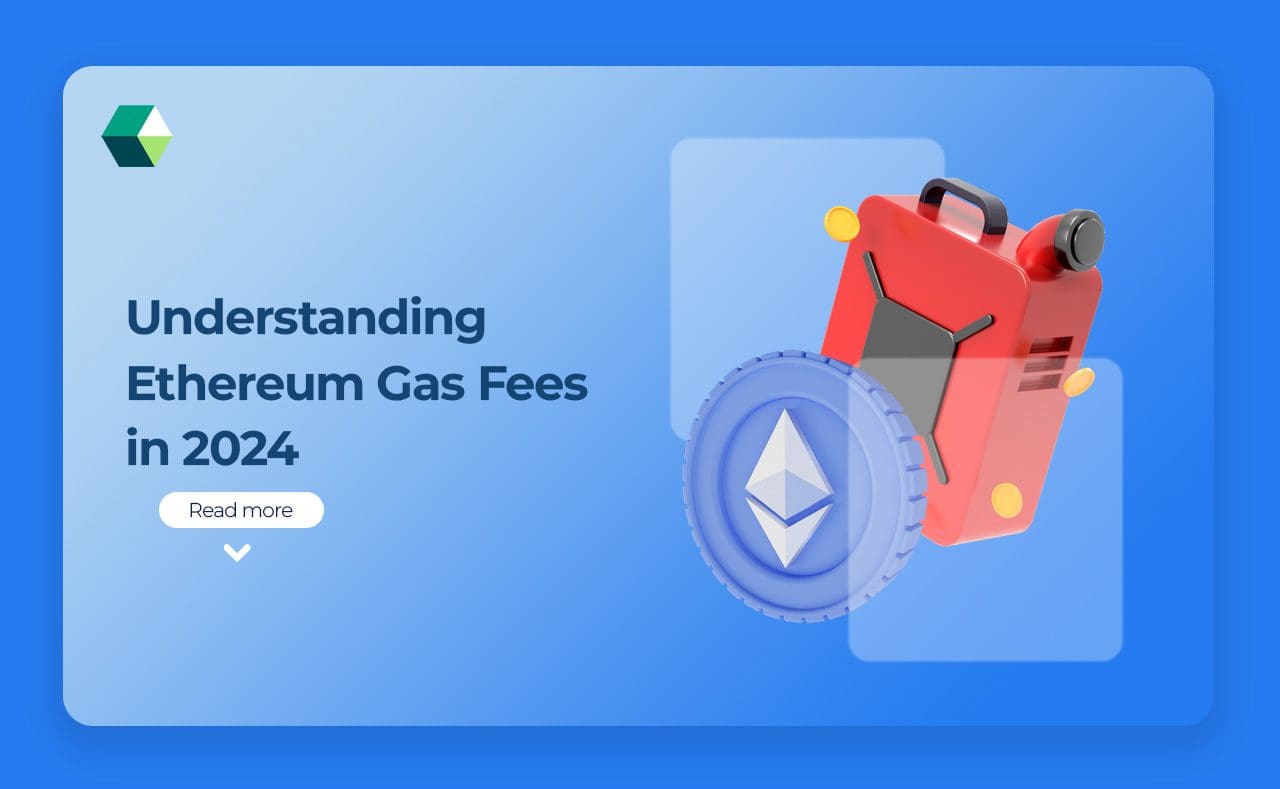Ethereum, the leading platform for Decentralized Applications (dApps) and Smart Contracts, is renowned for its flexibility and extensive use cases. However, a notable aspect of using Ethereum is the gas fee system, which can sometimes be a source of confusion for new users and developers alike.
What Are Ethereum Gas Fees?
Ethereum Gas Fees are the costs associated with executing transactions or smart contracts on the Ethereum Blockchain. These fees are essential for compensating miners or validators who process and validate transactions, ensuring the network remains secure and functional. Gas fees are denominated in Gwei, a smaller unit of Ether (ETH), and fluctuate based on network demand and congestion. High gas fees can occur during periods of intense activity, affecting the cost of transactions and Smart Contract Executions.
For businesses and developers, understanding Ethereum gas fees is crucial when planning blockchain projects. A reputable blockchain development company, such as Nadcab Labs, can provide valuable insights into optimizing transaction costs and managing gas fees effectively. This expertise helps ensure that projects remain cost-efficient and scalable while navigating the complexities of Ethereum’s fee structure.
How to Calculate Gas Fees on Ethereum?
Using MetaMask for dApps offers several key benefits:
-
Determine Gas Limit
The gas limit is the maximum amount of gas that a transaction or smart contract execution can use. For simple transactions, a standard limit is usually sufficient, but complex operations or interactions with smart contracts may require a higher limit. Accurate estimation of the gas limit ensures that your transaction will not run out of gas and fail.
-
Check Gas Price
Gas Price is the amount you’re willing to pay per unit of gas, measured in Gwei. Gas prices fluctuate based on network congestion. Use online tools or APIs to find the current gas prices to determine how much you need to pay. During periods of high demand, gas prices can increase significantly, affecting the overall cost of your transaction.
-
Calculate Total Gas Fee
Multiply the gas limit by the gas price to get the total gas fee. The formula is: Gas Fee = Gas Limit × Gas Price. For Ethereum Blockchain Development, this calculation helps in budgeting and optimizing transaction costs.
Common Ethereum Use Cases and Their Gas Costs
Ethereum’s various use cases come with different gas costs. For simple tasks like transferring Ether between wallets, the fees are usually quite low. However, more complex activities such as interacting with decentralized apps (dApps) or deploying smart contracts can be more expensive. For instance, operations in decentralized finance (DeFi) or creating Non-Fungible Tokens (NFTs) typically incur higher gas fees due to the additional computational work involved.
To manage these costs effectively, it’s beneficial to consult with a Blockchain Consulting Service. These experts can help you navigate and optimize gas fees, ensuring that your Ethereum-based projects are both cost-effective and efficient while maximizing the benefits of the Ethereum network.
How Will Ethereum 2.0 Change Gas Fees?
Introduction of Proof of Stake: Ethereum 2.0 will transition from Proof of Work (PoW) to Proof of Stake (PoS), which is expected to reduce the network’s overall gas fees. PoS is more energy-efficient and can handle more transactions simultaneously, potentially lowering transaction costs.
-
Sharding Implementation
Ethereum 2.0 will introduce sharding, a technique that splits the blockchain into smaller, manageable pieces called shards. This will increase transaction throughput and reduce congestion, leading to lower gas fees as the network can process more transactions concurrently.
-
Increased Scalability
The upgrade aims to significantly improve Ethereum’s scalability. By enhancing the network’s capacity to handle more transactions per second, Ethereum 2.0 will help decrease gas fees by minimizing the impact of network congestion.
-
Layer 2 Solutions
Ethereum 2.0 will also support various Layer 2 scaling solutions, such as rollups, which work off-chain and batch multiple transactions into a single one. These solutions can lower gas fees by reducing the data that needs to be processed directly on the Ethereum mainnet.
-
Blockchain Consulting Solutions
To navigate the changes brought by Ethereum 2.0 and optimize your projects accordingly, utilizing Blockchain Consulting Solutions can be highly beneficial. Experts can help you understand the new fee structure, implement cost-saving strategies, and make the most of Ethereum 2.0’s enhancements for a more efficient and cost-effective blockchain experience.
Impact of Ethereum Layer-2 Scaling Solutions on Gas Fees
Ethereum layer-2 scaling solutions are set to have a significant impact on gas fees by addressing the network’s limitations and improving transaction efficiency. Layer-2 scaling solutions, such as rollups and state channels, operate off-chain or on separate layers, handling transactions more efficiently and then settling them on the main Ethereum chain. This approach reduces the data load on the Ethereum mainnet, alleviating congestion and lowering gas fees.
By integrating these Layer 2 Blockchain Solutions, transactions become faster and more cost-effective, as they aggregate multiple operations into a single batch or manage interactions off-chain before finalizing them on the mainnet. This not only helps in minimizing the cost per transaction but also enhances overall network performance. For businesses and developers, leveraging Layer-2 scaling solutions is essential to optimizing gas fees and improving the efficiency of Ethereum-based applications.
How to Manage and Reduce Ethereum’s Gas Fees?
Managing and reducing Ethereum’s Gas Fees involves several strategic approaches. One effective method is to optimize smart contracts and transactions to minimize their gas consumption. This can be achieved by refining contract code to be more efficient and avoiding complex operations that consume excessive gas. Additionally, choosing optimal times for transactions when network congestion is lower can help reduce gas costs. Utilizing Layer-2 scaling solutions, such as Rollups or State Channels, can also alleviate congestion and lower fees by processing transactions off-chain before settling them on the mainnet.
Why Are Gas Fees Charged for Failed Transactions?
Gas Fees are charged for failed Ethereum Transactions due to the computational resources required to process and validate them. When a transaction is submitted, even if it fails, it consumes network resources such as processing power and storage space. The Ethereum network must execute the transaction code, check its validity, and verify the state changes, all of which require gas. If a transaction fails, the gas fee compensates miners or validators for their work in processing the transaction up to that point. This mechanism ensures that network resources are used efficiently and discourages frivolous or faulty ethereum transactions. Understanding this aspect is crucial for effective Blockchain Technology management and optimizing transaction strategies.
How to Check Ethereum’s Gas Fees?
For more tailored strategies, engaging with Custom Blockchain Development Services and Blockchain Consulting Solutions can provide valuable insights. Experts in these fields can help you implement efficient smart contract designs, choose the Best Layer-2 Solutions, and provide guidance on managing transaction timing to effectively control gas fees. Their expertise ensures that you make the most out of Ethereum’s capabilities while keeping costs in check.
-
Use Gas Fee Websites
Websites like Gas Now, Etherscan, or EthGasStation provide real-time information on Ethereum gas fees. These platforms show current gas prices in Gwei, allowing you to estimate the cost of your transactions.
-
Monitor Through Wallets
Many Ethereum wallets, such as MetaMask or Trust Wallet, display current gas prices and offer options to set custom gas fees based on network congestion. This helps you manage fees directly from your wallet interface.
-
Check with Blockchain Explorers
Blockchain explorers like Etherscan offer detailed transaction data and historical gas fee information, allowing you to see past gas prices and understand trends.
-
Use API Services
For developers, various APIs provide gas fee data that can be integrated into applications to dynamically check and manage fees.
-
Consult Blockchain Development Services
For more advanced needs, Blockchain Development Services can offer customized solutions to monitor and optimize gas fees according to your specific project requirements.
Why Do Gas Fees Fluctuate on Ethereum?
Gas fees on Ethereum fluctuate due to several factors related to network demand and supply. The primary reason for fluctuations is the variable network congestion; when many users are trying to execute transactions or interact with smart contracts simultaneously, the demand for block space increases, leading to higher gas prices.
Additionally, gas fees are influenced by the complexity of transactions—more complex operations require more computational resources and thus incur higher fees. Market dynamics also play a role, as users may offer higher gas prices to prioritize their transactions during peak times. This fluctuation ensures that the network remains secure and efficient by adjusting fees according to current demand and resource availability.
What Solutions does Nadcab Labs Offer for Gas Fees?
Nadcab Labs, a leading blockchain consulting company, offers a range of solutions to address Ethereum gas fees effectively. By leveraging advanced optimization techniques and expertise in Ethereum blockchain development, they provide tailored strategies to manage and reduce gas costs. Their approach includes smart contract optimization, efficient code deployment, and leveraging Layer-2 scaling solutions.
Additionally, they assist clients with gas fee forecasting and strategic adjustments based on real-time network conditions. These solutions are designed to enhance overall efficiency and cost-effectiveness for businesses and developers interacting with the Ethereum network.
Reviewed & Edited By

Aman Vaths
Founder of Nadcab Labs
Aman Vaths is the Founder & CTO of Nadcab Labs, a global digital engineering company delivering enterprise-grade solutions across AI, Web3, Blockchain, Big Data, Cloud, Cybersecurity, and Modern Application Development. With deep technical leadership and product innovation experience, Aman has positioned Nadcab Labs as one of the most advanced engineering companies driving the next era of intelligent, secure, and scalable software systems. Under his leadership, Nadcab Labs has built 2,000+ global projects across sectors including fintech, banking, healthcare, real estate, logistics, gaming, manufacturing, and next-generation DePIN networks. Aman’s strength lies in architecting high-performance systems, end-to-end platform engineering, and designing enterprise solutions that operate at global scale.






